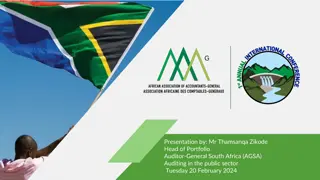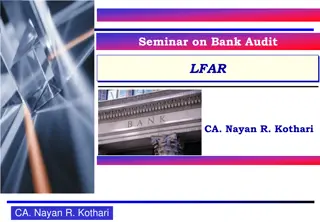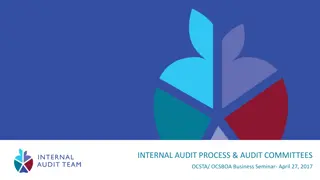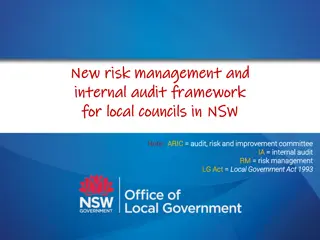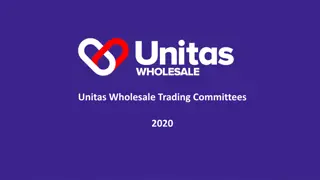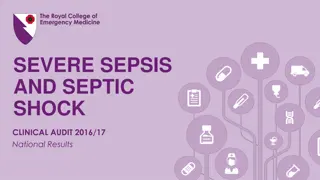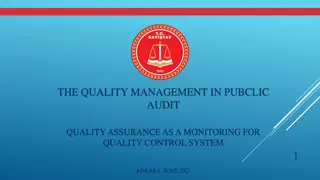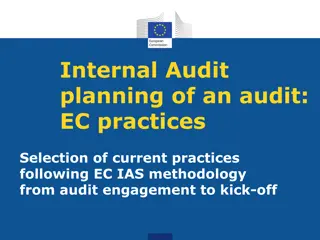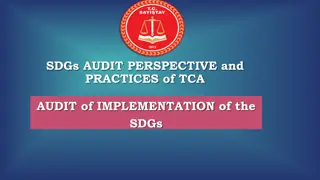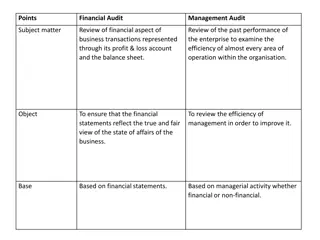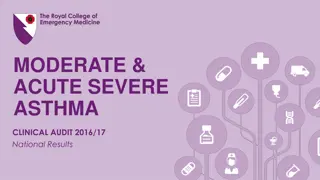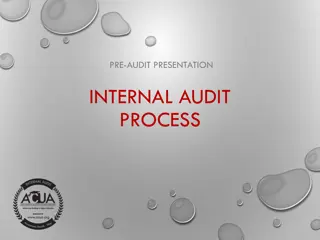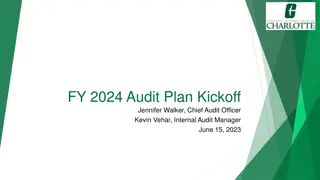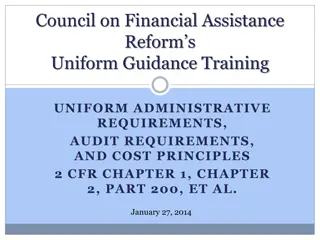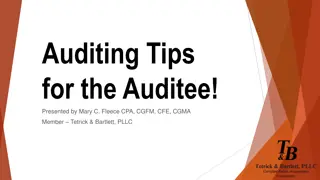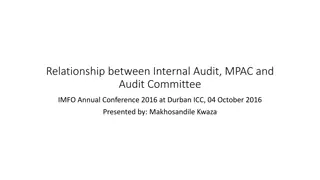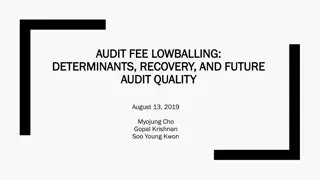Audit Committees in European Public Sector: Best Practices and Challenges
The cooperation between ECIIA and EUROSAI led to an exploration of public sector Audit Committees in European jurisdictions. Discover the role, benefits, and obstacles of Audit Committees, focusing on the UK government sector as a key player. Gain insights into the current practices, benefits, and challenges of establishing effective Audit Committees in the European public sector to promote good governance.
Uploaded on Oct 07, 2024 | 2 Views
Download Presentation

Please find below an Image/Link to download the presentation.
The content on the website is provided AS IS for your information and personal use only. It may not be sold, licensed, or shared on other websites without obtaining consent from the author.If you encounter any issues during the download, it is possible that the publisher has removed the file from their server.
You are allowed to download the files provided on this website for personal or commercial use, subject to the condition that they are used lawfully. All files are the property of their respective owners.
The content on the website is provided AS IS for your information and personal use only. It may not be sold, licensed, or shared on other websites without obtaining consent from the author.
E N D
Presentation Transcript
Joint Seminar Brussels 2017 1
Audit Committees in the European Public Sector Melvyn Neate 11 May 2017
Background Background The European Confederation of Institutes of Internal Auditing (ECIIA) and the European Organisation of Supreme Audit Institutions (EUROSAI) signed a Cooperation Agreement (2014) to facilitate the exchange of knowledge and information, develop a common understanding of public sector accountability and auditing and promote good governance across the European public sector. As part of this agreement, one of the initiatives was to explore the existence and operation of public sector Audit Committees across the European jurisdictions and to seek views on the potential or effective benefits arising from Audit Committees together with any obstacles that might prevent their effectiveness. After capturing these views the intention was to produce a paper describing the pan- European situation in the public sector with a view to promoting best practice.
Assignment Plan Assignment Plan Background information The current situation in the UK government sector, explaining the role, purpose and composition of the AC together with the benefits it can bring. The attributes of effective ACs together with the benefits and some potential difficulties to establishing ACs in the public sector. Examination of the AC situation in the wider European public sector detailing both current practice and obstacles to the widespread deployment of audit committees. Conclusions. Recommendation aimed at promoting best practice across the European public sector.
The UK Government Sector The UK Government Sector The global financial crisis in 2008 triggered a series of regulatory responses. In Europe this paved the way for a system of financial supervision in the banking, insurance and financial markets sectors which included changes to the scope and expectations of ACs. The development and repositioning of ACs in the financial services sector led to a reappraisal of ACs in other sectors. In the UK, ACs are now recognised as key contributors to good corporate governance and the public sector has fully embraced their use and has developed guidelines and good practice for their operation across both central and local government.
Audit Committees in the UK Audit Committees in the UK Listed company boards are required to establish an audit committee of at least three, or in the case of small companies two, independent non-executive directors [UK Corporate Governance Code]. All UK ministries are similarly required to have Audit Committees. The National Audit Office regards effective Audit Committees as key to helping public organisations achieve good corporate governance.
Views of the Profession Views of the Profession The Institute of Internal Auditors defines the AC in the private sector as, the governance body that is charged with oversight of the organisation s audit and control functions . For the government sector, INTOSAI s Internal Control Standards define the AC as, A committee of the board of directors whose role typically focuses on aspects of financial reporting and on the entity s processes to manage business and financial risk, and for compliance with significant legal, ethical and regulatory requirements [INTOSAI GOV 9100, Annex 2 Glossary, 2004].
Audit Committees in the UK Audit Committees in the UK The primary purpose of an AC in the UK government sector is to provide the Board and/ or the Accounting Officer with independent assurance on the adequacy and effectiveness of the organisation s risk management framework, internal control environment and the integrity of the governance and financial reporting processes. HM Treasury guidance, Corporate governance in central government departments: Code of Good Practice 2017 provides that: The Board should ensure that there are effective arrangements in place for governance, risk management and internal control. The Board should be supported by an Audit and Risk Assurance Committee (ARC) chaired by a suitably experienced non-executive board member.
Audit Committees in the UK Audit Committees in the UK The Code of Practice makes 6 supporting provisions: The Board and Accounting Officer should be supported by an ARC. Advising on risk is a board role. The ARC should support the Board in this role. The ARC should not have any executive responsibilities or be charged with making or endorsing any decisions. The Board should ensure that the ARC is adequately supported. The ARC should lead the assessment of the Board s annual Governance Statement. The ARC s TOR should be made publicly available [NB In practice this means that all government departments and agencies must establish an Audit and Risk Committee.]
Audit Committees in the UK Audit Committees in the UK HM Treasury Audit and Risk Assurance Committee Handbook [April 2013] sets out 5 good practice principles for ARCs in UK central government: ARC should be independent and objective; each member should have a good understanding of the organisation s objectives and priorities. ARC should have appropriate skills to enable it to function effectively. ARC should support the Board by reviewing the comprehensiveness and reliability of assurances on governance, risk management, the control environment and the integrity of financial statements and the annual report. The scope of the ARC should be formally defined in Terms of Reference and include all the assurance needs of the Board; the ARC should have particular engagement with the work of Internal Audit, Risk Management, the external auditor, financial management and reporting issues. ARC should communicate effectively with all key stakeholders, eg Board, CAE, external auditor, risk manager and other assurance providers.
Role of Audit and Risk Committee Role of Audit and Risk Committee in UK in UK Independent oversight , challenge and advice: Values and ethics. Strategic processes for risk, control and governance. Accounting policies/ accounts/ organisation s annual report. Planned activity and results of both internal and external audit. Adequacy of management response to issues identified by audit activity. Assurances on the management of risk and corporate governance. Anti-fraud policies and whistle-blowing processes [NB Decision-making rests with management].
How should ARCs be organised? How should ARCs be organised? Members should ideally be non-executives. Executives invited to attend to provide information, explanations and take part in discussions. Attended by both Internal and External Audit. Terms of Reference approved by the Board.
AC Benefits AC Benefits ACs follow up on the work of both the internal and external auditors to ensure that their recommendations are actioned promptly and effectively by executive management. At their best, ACs consider the overall assurance situation and support and promote effective relationships between external audit, internal audit and other assurance providers. AC scrutiny and challenge can result in improvements to governance, risk management and internal controls as well as financial reporting and management. All of these factors facilitate better decision making. Finally, an effective AC can strengthen public confidence that the organisation is being independently scrutinised.
Surveys Surveys Having completed background research on Audit Committees, with particular focus on the UK public sector it was jointly agreed that EUROSAI and ECIIA would independently survey their members across Europe to determine the AC situation.
CONFERENCE EUROSAI - ECCIA 1 2 3 4 5 6 7 8 9 10 11 12 13 It follows up the implementation of recommendations No specific standard of relationship. International Requirements Obliged? Supervisory Board Role not understood. Not obliged Yes Supervisory Board Independence CROATIA Good internal control and transparency Lack of knowledge, professional skills and experience Organization culture, bad management 1 International Requirements Supervisory Board Supervisory Board, IA & EA Indepen- dence Obliged Yes AC not recognized ESTONIA Depend s on the case Board or Director General Depends on the case See answer below To what extent have Audit Committees been established in public sector? Board, Director General and SAI corporate governance See answers below See answer below FINLAND Board, executive management, assurance providers A member of AC helps to intensify communication No specific standard of relationship. No formal relationships. Poor perfor- mance May create confusion International Requirements Internal control system. No legislative requirements No right Not obliged Yes Board GEORGIA composition of AC A high ranking official. Lack of Lack of knowledge and clear mandate. Very limited International Requirements Management of the public organization No Good first step understanding about AC & IA GREECE International Requirements Supervisory Board, IA & EA, Board Obliged: 3 countries See answers below See answers below See answers below Not obliged No - Independence None No legal obligation HUNGARY Minister & Board of directors. Internal control and transparency Required by an AC or code and not by management. Required by an AC or code and not by management. there is not sanction if there is no AC. International Requirements No formal relationships. Not obliged Yes Minister or Board ITALY None. Senior management, board of directors, IA Not obliged: 6 countries Subject to review by the courts of accounts. AC reviews SAI s reports No specific standard of relationship. No specific standard of relationship International Requirements Board of directors Good Not sanction if there is no AC. MOROCCO Obliged Yes None governance International Requirements Indepen- dence Obliged Yes Minister Minister Independence Independence POLAND Supervisory board, directors and IA & EA Owners of the organization or their representatives Parliament, Government, Shareholders IA&EA good internal control and internal auditing Good governance and transparency Lack of knowledge, professional skills and experience International Requirements Supervisory Board. Financial burden Not obliged - No funds available SERBIA International Requirements Board of directors The absence of a law Not obliged Yes None AC not mandatory SPAIN Depends: 4 countries Lack of knowledge, professional skills and experience Experience and lack of independence. Depends on the case International Requirements Parliament or Board See answer below lack of required expertise SWITZERLA No - None ND IA, EA andother assurance providers Depends on the case International Requirements Board / Council No perceived obstacles Yes See before See before None UK
CONFERENCE EUROSAI - ECCIA 1 2 3 4 5 6 7 8 9 10 11 12 13 It follows up the implementation of recommendations No specific standard of relationship. 2 International Requirements Supervisory Board Role not understood. Not obliged Yes Supervisory Board Independence CROATIA Good internal control and transparency Lack of knowledge, professional skills and experience Organization culture, bad management International Requirements Supervisory Board Have any standards/ guidelines been developed for the existence/ operation of these Audit Committees? Supervisory Board, IA & EA Indepen- dence Obliged Yes AC not recognized ESTONIA Depend s on the case Board or Director General Depends on the case See answer below Board, Director General and SAI corporate governance See answers below See answer below FINLAND Board, executive management, assurance providers A member of AC helps to intensify communication No specific standard of relationship. No formal relationships. DEPENDS 15% Poor perfor- mance May create confusion International Requirements Internal control system. No legislative requirements No right Not obliged Yes Board GEORGIA composition of AC A high ranking official. Lack of Lack of knowledge and clear mandate. Very limited International Requirements Management of the public organization No Good first step understanding about AC & IA GREECE International Requirements Supervisory Board, IA & EA, Board See answers below See answers below See answers below Not obliged No - Independence None No legal obligation HUNGARY Minister & Board of directors. Internal control and transparency Required by an AC or code and not by management. Required by an AC or code and not by management. YES 62% there is not sanction if there is no AC. International Requirements No formal relationships. Not obliged Yes Minister or Board ITALY None. Senior management, board of directors, IA 23% Subject to review by the courts of accounts. AC reviews SAI s reports No specific standard of relationship. No specific standard of relationship NO International Requirements Board of directors Good Not sanction if there is no AC. MOROCCO Obliged Yes None governance International Requirements Indepen- dence Obliged Yes Minister Minister Independence Independence POLAND Supervisory board, directors and IA & EA Owners of the organization or their representatives Parliament, Government, Shareholders IA&EA good internal control and internal auditing Good governance and transparency Lack of knowledge, professional skills and experience International Requirements Supervisory Board. Financial burden Not obliged - No funds available SERBIA International Requirements Board of directors The absence of a law Not obliged Yes None AC not mandatory SPAIN Lack of knowledge, professional skills and experience Experience and lack of independence. Depends on the case International Requirements Parliament or Board See answer below lack of required expertise SWITZERLA No - None ND IA, EA andother assurance providers Depends on the case International Requirements Board / Council No perceived obstacles Yes See before See before None UK
CONFERENCE EUROSAI - ECCIA 1 2 3 4 5 6 7 8 9 10 11 12 13 It follows up the implementation of recommendations No specific standard of relationship. Supervisory Board INTERNATIONAL REQUIREMENTS International Requirements Role not understood. Not obliged Yes Supervisory Board Independence CROATIA Good internal control and transparency Lack of knowledge, professional skills and experience Organization culture, bad management International Requirements Supervisory Board Supervisory Board, IA & EA Indepen- dence Obliged Yes AC not recognized ESTONIA Depend s on the case Board or Director General Depends on the case See answer below Board, Director General and SAI 3 corporate governance See answers below See answer below FINLAND Board, executive management, assurance providers A member of AC helps to intensify communication No specific standard of relationship. No formal relationships. Poor perfor- mance May create confusion International Requirements Internal control system. No legislative requirements No right Not obliged Yes Board Who are the members of these Audit Committees? GEORGIA composition of AC A high ranking official. Lack of Lack of knowledge and clear mandate. Very limited International Requirements Management of the public organization No Good first step understanding about AC & IA GREECE International Requirements Supervisory Board, IA & EA, Board See answers below See answers below See answers below Not obliged No - Independence None No legal obligation HUNGARY Minister & Board of directors. Internal control and transparency Required by an AC or code and not by management. Required by an AC or code and not by management. there is not sanction if there is no AC. International Requirements No formal relationships. Not obliged Yes Minister or Board ITALY None. Senior management, board of directors, IA Subject to review by the courts of accounts. AC reviews SAI s reports No specific standard of relationship. No specific standard of relationship International Requirements Board of directors All countries established INTERNATIONAL REQUIREMENTS Good Not sanction if there is no AC. MOROCCO Obliged Yes None governance International Requirements Indepen- dence Obliged Yes Minister Minister Independence Independence POLAND Supervisory board, directors and IA & EA Owners of the organization or their representatives Parliament, Government, Shareholders IA&EA good internal control and internal auditing Good governance and transparency Lack of knowledge, professional skills and experience International Requirements Supervisory Board. Financial burden Not obliged - No funds available SERBIA International Requirements Board of directors The absence of a law Not obliged Yes None AC not mandatory SPAIN Lack of knowledge, professional skills and experience Experience and lack of independence. Depends on the case International Requirements Parliament or Board See answer below lack of required expertise SWITZERLA No - None ND IA, EA andother assurance providers Depends on the case International Requirements Board / Council No perceived obstacles Yes See before See before None UK
CONFERENCE EUROSAI - ECCIA 1 2 3 4 5 6 7 8 9 10 11 12 13 CROATIA: Supervisory Board It follows up the implementation of recommendations No specific standard of relationship. FINLAND: Board or Director General International Requirements Supervisory Board Role not understood. Not obliged Yes Supervisory Board Independence CROATIA 5 ESTONIA: Supervisory Board Good internal control and transparency Lack of knowledge, professional skills and experience Organization culture, bad management International Requirements Supervisory Board Supervisory Board, IA & EA Indepen- dence Obliged Yes AC not recognized ESTONIA Depend s on the case Who are they accountable to? Board or Director General Depends on the case See answer below Board, Director General and SAI corporate governance See answers below GEORGIA: Board See answer below FINLAND Board, executive management, assurance providers A member of AC helps to intensify communication No specific standard of relationship. No formal relationships. ITALY: Minister & Board of Directors Poor perfor- mance May create confusion International Requirements Internal control system. No legislative requirements No right Not obliged Yes Board GEORGIA composition of AC GREECE: A high ranking official A high ranking official. Lack of Lack of knowledge and clear mandate. Very limited International Requirements Management of the public organization No Good first step understanding about AC & IA GREECE HUNGARY: International Requirements Supervisory Board, IA & EA, Board See answers below See answers below See answers below Not obliged No - Independence None No legal obligation HUNGARY Minister & Board of directors. Internal control and transparency Required by an AC or code and not by management. Required by an AC or code and not by management. there is not sanction if there is no AC. International Requirements No formal relationships. MOROCCO: Board of Directors Not obliged Yes Minister or Board ITALY None. Senior management, board of directors, IA Subject to review by the courts of accounts. AC reviews SAI s reports No specific standard of relationship. No specific standard of relationship International Requirements Board of directors Good Not sanction if there is no AC. MOROCCO Obliged Yes None governance POLAND: Minister International Requirements Indepen- dence Obliged Yes Minister Minister Independence Independence POLAND Supervisory board, directors and IA & EA Owners of the organization or their representatives Parliament, Government, Shareholders IA&EA good internal control and internal auditing Good governance and transparency Lack of knowledge, professional skills and experience International Requirements Supervisory Board. Financial burden SERBIA: Supervisory board Not obliged - No funds available SERBIA International Requirements Board of directors The absence of a law SPAIN: Board of Directors Not obliged Yes None AC not mandatory SPAIN Lack of knowledge, professional skills and experience Experience and lack of independence. Depends on the case International Requirements Parliament or Board See answer below lack of required expertise SWITZERLAND: Parliament of Board SWITZERLA No - None ND IA, EA andother assurance providers Depends on the case International Requirements Board / Council No perceived obstacles UK: Board & Council Yes See before See before None UK
CONFERENCE EUROSAI - ECCIA 1 2 3 4 5 6 7 8 9 10 11 12 13 It follows up the implementation of recommendations No specific standard of relationship. International Requirements Supervisory Board Role not understood. 9 Not obliged Yes Supervisory Board Independence CROATIA Good internal control and transparency Lack of knowledge, professional skills and experience Organization culture, bad management International Requirements Supervisory Board Supervisory Board, IA & EA Indepen- dence Obliged Yes AC not recognized ESTONIA Depend s on the case Board or Director General Depends on the case See answer below Board, Director General and SAI corporate governance See answers below See answer below FINLAND What is their relationship with the Supreme Audit Institution (SAI)? Board, executive management, assurance providers A member of AC helps to intensify communication No specific standard of relationship. No formal relationships. Poor perfor- mance May create confusion International Requirements Internal control system. No legislative requirements No right Not obliged Yes Board GEORGIA composition of AC A high ranking official. Lack of Lack of knowledge and clear mandate. Very limited International Requirements Management of the public organization No Good first step understanding about AC & IA GREECE International Requirements 6 of the 13 observed countries agree that there are NO SPECIFIC STANDARDS OF RELATIONSHIP Supervisory Board, IA & EA, Board See answers below See answers below See answers below Not obliged No - Independence None No legal obligation HUNGARY Minister & Board of directors. Internal control and transparency Required by an AC or code and not by management. Required by an AC or code and not by management. there is not sanction if there is no AC. International Requirements No formal relationships. Not obliged Yes Minister or Board ITALY None. Senior management, board of directors, IA Subject to review by the courts of accounts. AC reviews SAI s reports No specific standard of relationship. No specific standard of relationship International Requirements Board of directors Good Not sanction if there is no AC. MOROCCO Obliged Yes None governance International Requirements Indepen- dence Obliged Yes Minister Minister Independence Independence POLAND Supervisory board, directors and IA & EA Owners of the organization or their representatives Parliament, Government, Shareholders IA&EA good internal control and internal auditing Good governance and transparency Lack of knowledge, professional skills and experience International Requirements Supervisory Board. Financial burden Not obliged - No funds available SERBIA International Requirements Board of directors The absence of a law Not obliged Yes None AC not mandatory SPAIN Lack of knowledge, professional skills and experience Experience and lack of independence. Depends on the case International Requirements Parliament or Board See answer below lack of required expertise SWITZERLA No - None ND IA, EA andother assurance providers Depends on the case International Requirements Board / Council No perceived obstacles Yes See before See before None UK
CONFERENCE EUROSAI - ECCIA 1 2 3 4 5 6 7 8 9 10 11 12 13 It follows up the implementation of recommendations No specific standard of relationship. International Requirements Supervisory Board Role not understood. 10 Not obliged Yes Supervisory Board Independence CROATIA Good internal control and transparency Lack of knowledge, professional skills and experience Organization culture, bad management International Requirements Supervisory Board Supervisory Board, IA & EA Indepen- dence Obliged Yes AC not recognized ESTONIA Depend s on the case Board or Director General See answer below What do you perceive as the main benefits of these Audit Committees? Depends on the case See answer below Board, Director General and SAI corporate governance See answers below FINLAND Board, executive management, assurance providers A member of AC helps to intensify communication No specific standard of relationship. No formal relationships. Poor perfor- mance May create confusion International Requirements Internal control system. No legislative requirements No right Not obliged Yes Board GEORGIA composition of AC A high ranking official. Lack of Lack of knowledge and clear mandate. Very limited International Requirements Management of the public organization No Good first step understanding about AC & IA GREECE International Requirements Supervisory Board, IA & EA, Board See answers below See answers below See answers below Not obliged No - Independence None No legal obligation HUNGARY Minister & Board of directors. Internal control and transparency Required by an AC or code and not by management. Required by an AC or code and not by management. there is not sanction if there is no AC. International Requirements No formal relationships. Not obliged Yes Minister or Board ITALY None. Senior management, board of directors, IA Subject to review by the courts of accounts. AC reviews SAI s reports No specific standard of relationship. No specific standard of relationship International Requirements Board of directors Good Not sanction if there is no AC. MOROCCO Obliged Yes None governance International Requirements Indepen- dence Obliged Yes Minister Minister Independence Independence POLAND Supervisory board, directors and IA & EA Owners of the organization or their representatives Parliament, Government, Shareholders IA&EA good internal control and internal auditing Good governance and transparency Lack of knowledge, professional skills and experience International Requirements Supervisory Board. Financial burden Not obliged - No funds available SERBIA International Requirements Board of directors The absence of a law Not obliged Yes None AC not mandatory SPAIN Lack of knowledge, professional skills and experience Experience and lack of independence. Depends on the case International Requirements Parliament or Board See answer below lack of required expertise SWITZERLA No - None ND IA, EA andother assurance providers Depends on the case International Requirements Board / Council No perceived obstacles Yes See before See before None UK
CONFERENCE EUROSAI - ECCIA 1 1 2 2 3 3 4 4 5 5 6 6 7 7 8 8 9 9 10 10 11 11 12 12 13 13 It follows up the implementation of recommendations No specific standard of relationship. relationship. It follows up the implementation of recommendations No specific standard of 11 International Requirements Requirements Supervisory Board Board Role not understood. understood. International Supervisory Role not Not obliged Not obliged Yes Yes Supervisory Board Supervisory Board Independence Independence - CROATIA CROATIA Good internal control and transparency transparency Lack of knowledge, professional skills and experience Organization culture, bad management management Good internal control and Lack of knowledge, professional skills and experience Organization culture, bad International Requirements Requirements Supervisory Board Board Supervisory Board, IA & EA IA & EA Indepen- dence dence International Supervisory Supervisory Board, Indepen- Obliged Obliged Yes Yes AC not recognized AC not recognized ESTONIA ESTONIA Depend s on the case case Board or Director General General Depend s on the Board or Director Are there any Depends on the case on the case See answer below below Board, Director General and SAI General and SAI disadvantages? corporate governance governance See before Depends See answer Board, Director corporate See answers below See answers below See answer below See answer below FINLAND FINLAND Board, executive management, assurance providers assurance providers A member of AC helps to intensify communication No specific standard of relationship. No formal relationships. relationships. Poor perfor- mance May create confusion confusion Board, executive management, A member of AC helps to intensify communication No specific standard of relationship. No formal Poor perfor- mance May create International Requirements Requirements Internal control system. system. No legislative requirements requirements No right No right International Internal control No legislative Not obliged Not obliged Yes Yes Board Board GEORGIA GEORGIA composition of AC composition of AC A high ranking official. official. Lack of Lack of understanding about AC & IA Lack of knowledge and clear mandate. mandate. A high ranking Lack of knowledge and clear Very limited limited International Requirements Requirements Management of the public organization public organization Very International Management of the No No Good first step Good first step understanding about AC & IA GREECE GREECE International Requirements Requirements Supervisory Board, IA & EA, Board IA & EA, Board International Supervisory Board, See answers below See answers below See answers below See answers below See answers below See answers below Not obliged Not obliged No No - - Independence Independence None None No legal obligation No legal obligation HUNGARY HUNGARY Minister & Board of directors. directors. Internal control and transparency transparency Required by an AC or code and not by management. Required by an AC or code and not by management. management. there is not sanction if there is no AC. no AC. Minister & Board of Internal control and Required by an AC or code and not by management. Required by an AC or code and not by there is not sanction if there is International Requirements Requirements YES (6) No formal relationships. relationships. International No formal Not obliged Yes Yes Minister or Board Minister or Board ITALY ITALY Not obliged None. None. Senior management, board of directors, IA IA Subject to review by the courts of accounts. AC reviews SAI s reports No specific standard of relationship. No specific standard of relationship relationship Senior management, board of directors, Subject to review by the courts of accounts. AC reviews SAI s reports No specific standard of relationship. No specific standard of International Requirements Requirements Board of directors directors Good Good governance Not sanction if there is no AC. there is no AC. International Board of Not sanction if MOROCCO Obliged MOROCCO Obliged Yes Yes None None governance International Requirements Requirements NO (6) Indepen- dence dence International Indepen- Obliged Obliged Yes Yes Minister Minister Minister Minister Independence Independence Independence Independence POLAND POLAND Supervisory board, directors and IA & EA Owners of the organization or their representatives Parliament, Government, Shareholders IA&EA Shareholders IA&EA good internal control and internal auditing Good governance and transparency transparency Lack of knowledge, professional skills and experience and experience Supervisory board, directors and IA & EA Owners of the organization or their representatives Parliament, Government, good internal control and internal auditing Good governance and Lack of knowledge, professional skills International Requirements Requirements Supervisory Board. Board. Financial burden burden International Supervisory Financial Not obliged Not obliged - - No funds available No funds available SERBIA SERBIA International Requirements Requirements N/A (1) Board of directors directors The absence of a law law International Board of The absence of a Not obliged Not obliged Yes Yes None None AC not mandatory AC not mandatory SPAIN SPAIN Lack of knowledge, professional skills and experience Experience and lack of independence. independence. Lack of knowledge, professional skills and experience Experience and lack of Depends on the case on the case International Requirements Requirements Parliament or Board or Board See answer below below lack of required expertise expertise SWITZERLA SWITZERLA Depends International Parliament See answer lack of required No No - - None None ND ND IA, EA andother assurance providers assurance providers IA, EA andother Depends on the case on the case International Requirements Requirements Board / Council Council No perceived obstacles obstacles Depends International Board / No perceived Yes Yes See before See before See before See before None None UK UK
CONFERENCE EUROSAI - ECCIA 1 2 3 4 5 6 7 8 9 10 11 12 13 It follows up the implementation of recommendations No specific standard of relationship. International Requirements Supervisory Board Role not understood. Not obliged Yes Supervisory Board Independence CROATIA 12 Good internal control and transparency Lack of knowledge, professional skills and experience Organization culture, bad management International Requirements What are the main obstacles to their establishment? Supervisory Board Supervisory Board, IA & EA Indepen- dence Obliged Yes AC not recognized ESTONIA Depend s on the case Board or Director General Depends on the case See answer below Board, Director General and SAI corporate governance See answers below See answer below FINLAND Board, executive management, assurance providers A member of AC helps to intensify communication No specific standard of relationship. No formal relationships. Poor perfor- mance May create confusion International Requirements Internal control system. No legislative requirements No right Not obliged Yes Board GEORGIA composition of AC A high ranking official. Lack of Lack of knowledge and clear mandate. Very limited International Requirements Management of the public organization No Good first step understanding about AC & IA GREECE International Requirements Supervisory Board, IA & EA, Board See answers below See answers below See answers below Not obliged No - Independence None No legal obligation HUNGARY Minister & Board of directors. CONCLUSION: Internal control and transparency Required by an AC or code and not by management. Required by an AC or code and not by management. there is not sanction if there is no AC. International Requirements No formal relationships. Not obliged Yes Minister or Board ITALY None. Senior management, board of directors, IA Subject to review by the courts of accounts. AC reviews SAI s reports No specific standard of relationship. No specific standard of relationship International Requirements IT IS NOT TOO INTEGRATED AND NOT SUFFICIENTLY IMPORTANT LEGISLATIVELY Board of directors Good Not sanction if there is no AC. MOROCCO Obliged Yes None governance International Requirements Indepen- dence Obliged Yes Minister Minister Independence Independence POLAND Supervisory board, directors and IA & EA Owners of the organization or their representatives Parliament, Government, Shareholders IA&EA good internal control and internal auditing Good governance and transparency Lack of knowledge, professional skills and experience International Requirements Supervisory Board. Financial burden Not obliged - No funds available SERBIA International Requirements Board of directors The absence of a law Not obliged Yes None AC not mandatory SPAIN Lack of knowledge, professional skills and experience Experience and lack of independence. Depends on the case International Requirements Parliament or Board See answer below lack of required expertise SWITZERLA No - None ND IA, EA andother assurance providers Depends on the case International Requirements Board / Council No perceived obstacles Yes See before See before None UK
CONFERENCE EUROSAI - ECCIA 1 2 3 4 5 6 7 8 9 10 11 12 13 It follows up the implementation of recommendations No specific standard of relationship. Lack of knowledge, Experience & Independence International Requirements 13 Supervisory Board Role not understood. Not obliged Yes Supervisory Board Independence CROATIA Good internal control and transparency Lack of knowledge, professional skills and experience Organization culture, bad management International Requirements Supervisory Board Supervisory Board, IA & EA Indepen- dence Obliged Yes AC not recognized ESTONIA Depend s on the case What are the main obstacles to their effective operation? Board or Director General Depends on the case See answer below Board, Director General and SAI corporate governance See answers below See answer below FINLAND Board, executive management, assurance providers A member of AC helps to intensify communication No specific standard of relationship. No formal relationships. Poor perfor- mance May create confusion International Requirements Internal control system. No legislative requirements No right Not obliged Yes Board GEORGIA composition of AC A high ranking official. Lack of Lack of knowledge and clear mandate. Very limited International Requirements Management of the public organization No Good first step understanding about AC & IA GREECE International Requirements Supervisory Board, IA & EA, Board See answers below See answers below See answers below Not obliged No - Independence None No legal obligation HUNGARY Minister & Board of directors. Internal control and transparency Required by an AC or code and not by management. Required by an AC or code and not by management. there is not sanction if there is no AC. International Requirements No formal relationships. Not obliged Yes Minister or Board ITALY None. Senior management, board of directors, IA Subject to review by the courts of accounts. AC reviews SAI s reports No specific standard of relationship. No specific standard of relationship International Requirements Board of directors Good Not sanction if there is no AC. MOROCCO Obliged Yes None governance International Requirements Indepen- dence Obliged Yes Minister Minister Independence Independence POLAND Supervisory board, directors and IA & EA Owners of the organization or their representatives Parliament, Government, Shareholders IA&EA good internal control and internal auditing Good governance and transparency Lack of knowledge, professional skills and experience International Requirements Supervisory Board. Financial burden Not obliged - No funds available SERBIA International Requirements Board of directors The absence of a law Not obliged Yes None AC not mandatory SPAIN Lack of knowledge, professional skills and experience Experience and lack of independence. Depends on the case International Requirements Parliament or Board See answer below lack of required expertise SWITZERLA No - None ND IA, EA andother assurance providers Depends on the case International Requirements Board / Council No perceived obstacles Yes See before See before None UK



